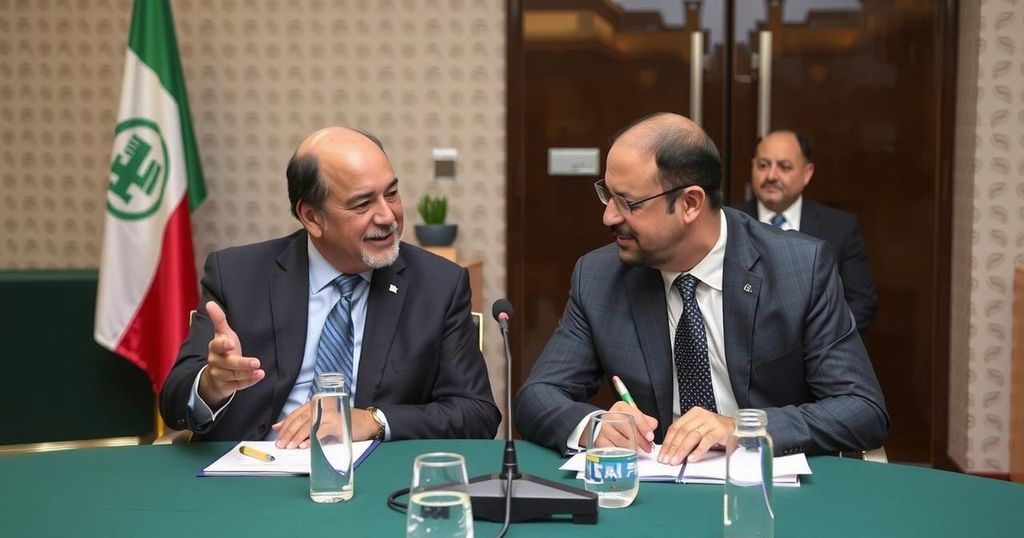Libya’s Minister of State for Communication and Political Affairs, Walid Ellafi, met with Syria’s new leader, Ahmed al-Sharaa, to discuss diplomatic relations, energy cooperation, and migration issues, particularly the crisis faced by Syrians since 2011. They deliberated on security and military cooperation while aiming to enhance diplomatic representation between the two nations, marking a significant stride in their bilateral relations amid regional changes.
A senior official from Libya’s United Nations-recognized government held discussions with Syria’s newly appointed leader, Ahmed al-Sharaa, in Damascus on Saturday. The dialogue focused on diplomatic relations and highlighted issues such as energy cooperation and migration management. Libyan Minister of State for Communication and Political Affairs, Walid Ellafi, asserted their support for the Syrian authorities during this critical transitional phase and underscored the need for enhanced coordination on security and military matters.
Ellafi remarked on the significance of collaboration regarding trade and the issue of illegal immigration, specifically noting the plight of Syrians who, in search of better opportunities since the outbreak of civil war in 2011, have attempted dangerous crossings to Libya and beyond. Furthermore, the Libyan official mentioned aspirations to elevate diplomatic representation between the nations, indicating that a charge d’affaires was present at the meeting and plans for a permanent ambassador were underway.
The political landscape in Libya remains divided, with the UN-recognized authority in Tripoli contending with a rival government in the east, supported by military figure Khalifa Haftar. It is noteworthy that Syrian representatives from Haftar’s administration reestablished diplomatic engagements in Damascus in March 2020, marking a significant development following a prolonged absence of Libyan representation there since the ousting of longtime ruler Moamer Kadhafi in 2011.
Additionally, photographs released by the Syrian state news agency, SANA, depicted Sharaa conferring with Bahrain’s strategic security chief, Sheikh Ahmed bin Abdulaziz Al-Khalifa. A Bahraini government spokesperson expressed that the meeting, occurring amidst Bahrain’s presidency of the current Arab Summit, reinforced their commitment to fostering dialogue for Syria’s recovery and stability. They discussed regional security and Bahrain’s role in promoting an inclusive transitional process for reconciliation and humanitarian aid for the Syrian populace.
The transition of power in Syria, following the removal of President Bashar al-Assad, witnessed diplomatic overtures from numerous nations throughout the region as they seek to establish meaningful engagement with Sharaa’s administration. Such developments indicate a renewed interest in diplomatic relations and regional stability in the wake of the recent significant political shifts in Syria.
The recent meeting between Libyan official Walid Ellafi and Syrian leader Ahmed al-Sharaa symbolizes a crucial step towards enhancing bilateral relations amidst ongoing socio-political challenges in both nations. Since the onset of Syria’s civil conflict in 2011, issues pertaining to migration, energy cooperation, and security have emerged as vital topics for discussion, affecting both countries. Libya’s political scenario is characterized by a split between the UN-recognized government in Tripoli and an opposition administration led by Khalifa Haftar in the east. This fractious political context complicates diplomatic efforts but also provides an opportunity for dialogue as regional actors reassess their foreign policies in light of these transitions. The re-engagement of Syrian authorities with various Arab states reflects an ongoing trend of regional reconciliation and cooperation following a decade of conflict and upheaval, especially following the toppling of longstanding leaders such as Kadhafi and Assad.
In conclusion, the meeting between Libya’s Walid Ellafi and Syria’s Ahmed al-Sharaa underscores a pivotal moment in the quest for enhanced diplomatic ties and cooperation on pressing issues such as energy and migration. As both nations navigate their complex political contexts, collaborative efforts may provide avenues for security and economic recovery. Moreover, regional actors are increasingly engaging with the new Syrian authorities, reflecting broader trends in Arab diplomatic relations seeking stability and prosperous transitions in post-conflict scenarios.
Original Source: www.hindustantimes.com






